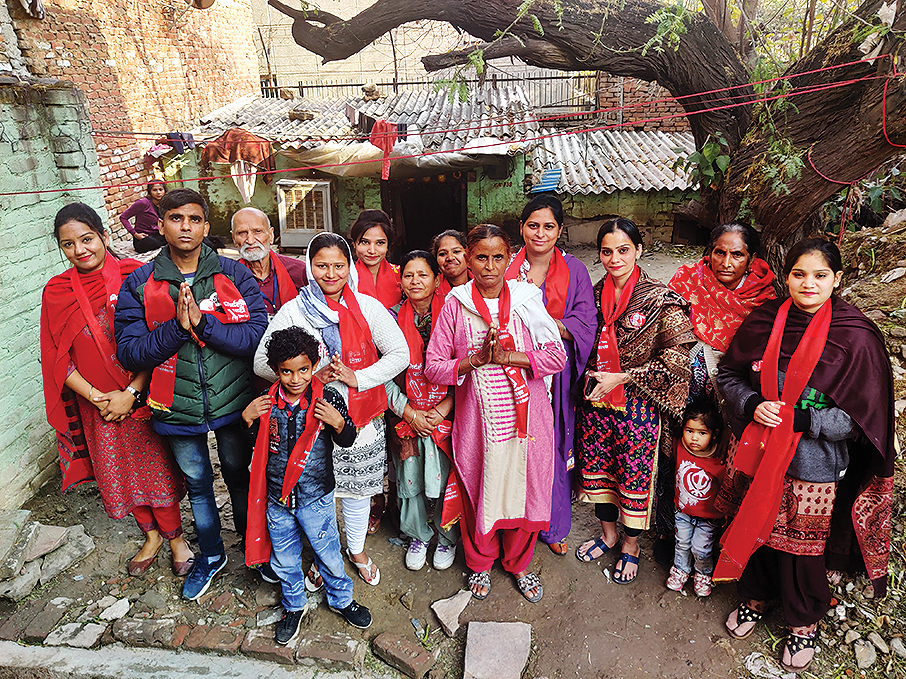
I MUST have asked more than a couple of times, “Why do you think you have a chance to win”? And each time, the answers did not justify the energy put into a contest defeat is almost a certainty. I was meeting Neesha for a story on independent candidates. She was one of the 148 candidates running without party backing in the just concluded Delhi Assembly elections.
The 32-year-old shares a home with her husband, a child, mother-in-law and her late brother-in-law’s two children in East Delhi’s Vishwas Nagar, which has almost two lakh voters (1,99,929 to be precise) according to the Election Commission.
Interestingly, she is not the only candidate to run from here. There were eight others from the same district — which was also one of only three districts to vote for the BJP and not AAP. And this time again, it was the BJP that won.
When I met Neesha, there was just little over a week left for elections, but it didn’t matter to her. She was confident, with little attention on the streets, other than her own neighborhood where she belonged.
“Do people know about you? Have you gone and campaigned door to door?” Were some of my questions. The answers of both were negative.
One of her ways to show they were not too far behind in campaigning were the TikTok videos. Her family at least was backing her and perhaps all that mattered was that this woman, who worked as a house help, had the option to run for office. That too for a few days, if even could dream of a better world.
However, her husband did take charge to answer most of our questions.When I said, “Please let your wife speak”, Neesha responded, “It’s the same thing”. At times even when she wanted to, her husband spoke for her. When I asked why were you fighting the elections, one of the responses was to help women, “and as she is a woman” the husband pointing towards Neesha, “we thought she must run”.
From the last Assembly poll of 2015, one can also see how women use the provision to independently run in the elections. The male to female ratio of candidates in 2015 was pretty dismal. While there was a total of 673 candidates, the huge chunk were men. There were — 606 male candidates and only 66 female candidates.
Out of the 66 there were 17 women who were independent candidates. In the Shahdara constituency all three independent candidates were women.
Maybe then Neesha’s confidence made sense, as she thought that a woman may vote for her. But it doesn’t work that way, as can be seen from the results of February 11, where she managed to win 143 votes.
The other candidate we met was 70-year-old Daya Shankar Agarwal. A former professor, unlike Neesha who has not had any form of formal education. What the two shared was the belief that they could win their seat.
Daya, an eccentric man running from the New Delhi constituency, had also not campaigned. This was not his first attempt. Earlier he had run for presidential elections twice.
Also, unlike Neesha, Daya had an office to work out of, which was printing his campaign posters — mind you in black and white, to save money.
He believed that his over 30 years of teaching yoga in Lodhi Garden was enough to garner votes and a win.
But why not? Time and time again there has been a conversation on how there must be alternatives to the current political dispensation.
While Delhi elections in 2013, 2015 and now in 2020 have never gotten an independent elected, looking at the Lok Sabha polls where a few at least did win gives hope.
Since the first elections, the highest number of winning independent candidates was seen in 1957 elections when they won 42 seats, and 37 seats back in 1952.
According to one report, a total of 44,962 independents have contested polls since Independence but only 222 of them have won to become Members of Parliament (MP).
In the 2019 Lok Sabha elections, four independent candidates won. One from Dadra & Nagar Haveli, another from Assam, and lastly from Maharashtra. Before that from 2014, three independent candidates won.
So maybe they don’t stand a chance here in Delhi yet, but one has to commend their belief in an electoral system which can make a nobody a representative of the people.
Palam logged 15.3 degrees Celsius, 2.7 degrees above normal, while Lodhi Road was slightly cooler…
With Edwin Lutyens’s statue now removed from Rashtrapati Bhavan, Delhi’s evolving relationship with its imperial…
Around 100 international flights were cancelled at Delhi airport due to disruptions linked to the…
Due to mounting debt and constant pressure, he decided to kill his family and leave…
According to the police, information was received from GTB Hospital regarding the admission of an…
Over 75,000 fans filled Jawaharlal Nehru Stadium as Karan Aujla delivered one of India’s biggest…